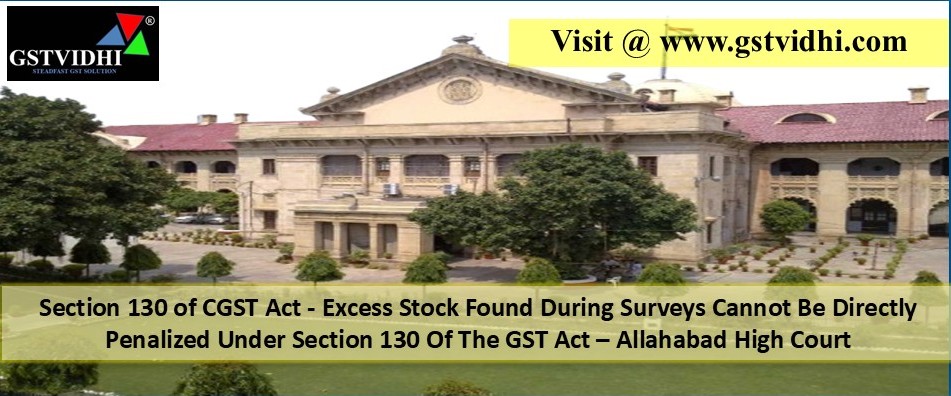
Section 130 of CGST Act - Excess Stock Found During Surveys
Cannot Be Directly Penalized Under Section 130 Of The GST Act – Allahabad High
Court
Background
of the Case
M/s J.T. Steel Traders, a
registered company dealing in steel coils and steel items, faced GST demand
orders following a survey conducted on 08.08.2019 at its business
premises. During the survey, the department alleged that excess stock was
found, though this was determined purely through eye estimation
without actual weighment.
Based on this, the Deputy
Commissioner issued an order on 09.01.2020, initiating proceedings under Section
130 of the CGST/UPGST Act. The petitioner’s appeal to the Additional
Commissioner was rejected on 31.05.2022. Aggrieved, the petitioner
challenged both orders before the Allahabad High Court, arguing that the
department adopted an illegal route for assessment and penalty.
·
J.T. Steel Traders v. State of U.P.
& Others
· Court:
High Court of Judicature at Allahabad
· Case
No.:
Writ Tax No. 1154 of 2022
· Order
Date: 28 July 2025
Submissions
by the Petitioner
Counsel: Mr. Gauransh
Mishra (holding brief for Mr. Pranjal Shukla)
The petitioner submitted that:
- The stock assessment during survey
was not based on actual weighment, but only on visual
approximation.
- Even if excess stock was found, the
proper course of action was to initiate proceedings under Section 73 or
74, not Section 130.
- There was no intention to evade
tax, nor any evidence of such intent in the departmental findings.
- Cited the precedent of M/s Vijay
Trading Company, where similar action under Section 130 was quashed.
- Highlighted that the Supreme Court
had affirmed the legality of the Vijay Trading Company ruling.
Submissions
by the State Respondents
Counsel: Mr. Ravi Shanker
Pandey, Additional Chief Standing Counsel
The department supported the impugned orders and maintained that:
- Excess stock found during the survey
justified action under Section 130.
- The authorities acted in accordance
with the law and had sufficient basis for the penalty.
Court's
Observations
After reviewing the
record and hearing both sides, the Court noted the following:
- It was undisputed that a survey
occurred and some excess stock was visually observed.
- However, actual weighment was not
conducted, and no conclusive evidence of tax evasion was
established.
- The Court emphasized that:
“If excess stock is
found, then proceedings under Section 73 or 74 should be invoked, not
Section 130.”
- The Court cited several rulings
including:
- M/s Dinesh Kumar Pradeep Kumar
- M/s Shree Om Steels
- Maa Mahamaya Alloys Pvt. Ltd.
- Metenere Limited
These cases all supported
the principle that tax determination based on unaccounted goods must follow
the procedure under Sections 73 or 74, not direct invocation of seizure and
penalty under Section 130.
Key Legal
Points
- Section 35(6)
of the CGST Act allows officers to deem unaccounted goods as supplied—but
only for the purpose of tax assessment under Section 73 or 74.
- Section 130
applies only when there is clear intent to evade tax, which must be
proven with evidence.
- Penalties for excess stock must
follow the structured mechanism of show cause, opportunity to be heard,
and proper determination, not summary action.
Final
Judgment
The High Court concluded:
“In view of the above,
impugned order dated 9.1.2020 passed by Deputy Commissioner and order dated
31.5.2022 passed by Additional Commissioner cannot be sustained in the eyes of
law.”
Accordingly:
- Both orders were quashed.
- The writ petition was allowed in
full, in favor of J.T. Steel Traders.
Conclusion
This judgment reinforces
the principle that excess stock found during surveys cannot be directly
penalized under Section 130 of the GST Act unless there is evidence of
fraudulent intent. It reaffirms that Section 73 or 74 is the correct
legal route for tax recovery and penalty assessment in such cases.
For taxpayers, this is an
important precedent that ensures procedural safeguards and protects
against arbitrary tax demands without proper adjudication.
Disclaimer: All the Information is based on the notification, circular advisory and order issued by the Govt. authority and judgement delivered by the court or the authority information is strictly for educational purposes and on the basis of our best understanding of laws & not binding on anyone.
Press On Click Here To Download Order File
Click here